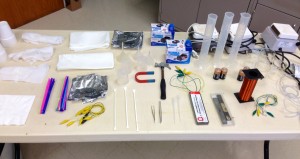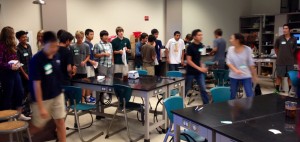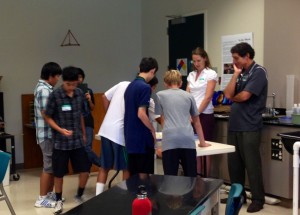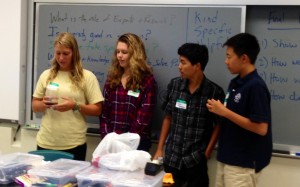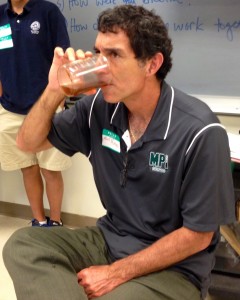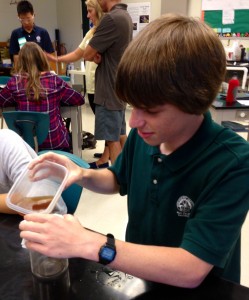The Thirsty Games
***Prelude Starts***
On August 9, we had 20 of our 30 MPX students come in for an experience we called the Thirsty Games. Before I explain what we did, a little about why we did it.
Last year, we started the year with an aggresive look at sustainability in the islands – looking at the world issues around resources (energy, water, education, food, etc) then zeroed in on our islands with its unique problems. We visited both Matson (point of incoming goods) and HPower (point of trash). We had students map their own ins and outs to create a better sense of their own footprint. Full description here:
http://mpx2012proj1.wikispaces.com/home
The problem – it was conceptually too big at the start and some students switched out before they really had given our way of learning a full try (at MPI students can switch a class – not a teacher – only within the first 2 weeks of school). For the students who did stay in, they felt it took longer than 2 weeks to really understand what MPX is and why it is powerful (perhaps those students would have left even after a longer time, but we will never know).
So, how to change this concern tension at the start? We designed a 3 hour experience to give us time to have the students see the whole problem, beginning to end. Our goal was to walk through a mini-project so students could see the parts of what we do. Thirsty Games was born!
**Prelude Ends***
One of our challenges as we move through the 21st Century is the scarcity of resources: Food, Energy, Housing, Medicine, and Clean Water. We wanted to give our new MPX 9 students a chance to both model the way we learn in our project based Mid-Pacific Exploratory program and to do it through a challenge that is real.
The United Nations states that “783 million people do not have access to clean water and almost 2.5 billion do not have access to adequate sanitation. ”
– http://www.unwater.org/water-cooperation-2013/water-cooperation/facts-and-figures/
That is 11% of the planet! How do we understand this problem and become advocates? What can we do here?
What have other people tried?
In this challenge, students in teams of four were given a 300 mL sample of dirty water. The goal is simple: figure out and implement a process to get the water so that it is drinkable by the end of the activity. In order to be eligible for recognition, at least 150 100 mL must still be left.
Our facilitation panel observed, and recognized three teams at the end in three categories:
most creative approach
most effective technique
best team cohesion
Rubrics were developed and shared with students outlining the criteria and descriptions for each category. The overall schedule the activity played out as follows:
Ice breakers – a brief “getting to know you” time.
What do we do in MPX? We showed 2 finished work examples:
Japanese Internment Project: http://www.youtube.com/watch?v=6mnECZt6zPc&feature=youtu.be
Aquaponics Project: http://mpx9spring.weebly.com/aquaponics-home.html
Hunger games activity introduced – groups formed, activity explained
Students had 10 minutes to consider what techniques might be used to clean the water – what would the ideal list of tools and processes be to get from dirty water to clean water?
We showed them a brief clip from the start of the mad dash to the cornucopia in the hunger games movie,
then…
Thirsty games cornucopia –
The table was uncovered so the students could now see what their options are for cleaning the water.
One person from each team can only walk over – only take one item at a time, can only take a total of 4 items
First round design and construction with 10th MPX grade facilitators – (they also shared what it feels like, what is a group member skills, why do MPX as they coach the teams)
We then asked each group to briefly describe where they were asked with their work and modeled critiquing and feedback from class and facilitators. one of the clearest ways to get improved work from students is to give them an opportunity to reflect and give each other feedback that is meaningful – helpful, specific, kind. One of our goals in our program is to help students understand how to develop this skill, because if we can truly get there, the quality of their work goes dramatically.
Students were then told they could go back to the cornucopia for two more items, and they were also allowed a two-minute window where they could barter with other groups for equipment that they wish they had.
Teams were given an additional 2nd round construction for 30 minutes. While this was happening, our guest 10th grade MPX students and teachers walked between groups and a feedback as well as observed based on the rubrics which groups were meeting the criteria for our three award categories
Finally, after cleaning up, groups presented to classmates and guest MPXer’s, and Mark Hines conducted the last proof of accomplishment – he drank each teams final water!
At the end of every activity, we know when important part of the cycle of learning is to debrief what we did, and asked the questions what worked for us? And what could have made this a better experience? We asked our students to consider this, and be prepared on Tuesday to answer that question.
As we were working, questions came into our thinking like:
Is this learning, when the teacher is facilitating and not telling students what to do all the time?
Is diversity in a group a good thing – when people have different skills and knowledge does it broaden our thinking?
What is the role of feedback and critiquing to improve our work?
When we learn, are different pathways to the end acceptable? Is it a good thing when students arrive at the same answer through different means?
What are the excitements and challenges in doing project work? Who does this work serve?
What skills and knowledge do you need, and what role do experts play in helping us get there?
We finally did a student survey trying to get a little more information about what kinds of interests in question the students had to help a shape this year, had some pizza and cookies, and called it a day.
All in all, our first attempt at doing our version of “thirsty games” was a big success.
Looking forward to an exciting year with our MPX’ers!
Website with info and images here:
http://thirsty-games.weebly.com
some links to a few movies of our students in action:
IMG_2769
IMG_2774
IMG_2772

